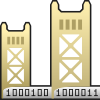 |
Links & Resources |  |
| Programming Language Hompages |
| Main | |
|
|
Latest News |
|
|
Getting Started |
|
|
Screen Shots |
|
|
Download |
|
|
Documentation |
|
|
Contributors |
|
|
Contact |
| About GOLD | |
|
|
How It Works |
|
|
FAQ |
|
|
Why Use GOLD? |
|
|
Comparison |
|
|
Revision History |
|
|
Freeware License |
|
|
More ... |
![]()
The page
contains links to the homepages of different programming languages. If there is a language
that you would like added to this page, please ![]() tell me about it.
tell me about it.
| Programming Language Homepages | |
| Ada | The Ada programming language was developed by Honeywell-Bull, under contract by the United States Department of Defense, to establish a "Common High Order Language" for U.S. Department of Defense embedded systems. However, the language has also gained wide support in commercial applications and in academic studies. |
| C | C was designed for the creation of low-level systems such as operating systems, device drivers, firmware, etc... To realize this goal, the language contains the ability to perform operations directly on memory and has direct access to system pointers. While this gives an enormous amount of control and flexibility, it also makes C a professional programming language - not to be used by an inexperienced programmer. |
| Delphi | The Delphi Programming Language evolved from the Pascal Programming Language with the guidance of the Borland Corporation. Delphi contains a large number of class-library and language improvements over Pascal. |
| D | The D Programming Language was designed to combine the efficiently of C with modern object orientation programming concepts. |
| Java | The Java programming language was designed by Sun Microsystems as clean and easy to program version of C++. As part of the language definition, Java programs compile into the Java Virtual Machine bytecode, which is designed to run on multiple platforms through interpretation. |
| LISP | LISP is one of the oldest programming language in use today; second only to FORTRAN. It was invented by mathematician John McCarthy and organizes data into abstract "lists"; which are delimited by parenthesis. This metaphor is used for both data and functions and yields a degree of orthogonality not seen in most languages. |
| Python | The Python Programming Language was developed Guido van
Rossum in early 1991. The language is unique in a number of ways - which include the
features of the language and the programming "culture" involved. The Python Language is multi-paradigm which allows the developer to use object oriented, procedural, functional, etc programming depending on the problem at hand. In addition, the Python "culture" attempts to keep the field "fun" which is evident from the name of the language. It was named after the popular 1970's BBC show "Monty Python's Flying Circus". |
| Ruby | The Ruby Programming Language was created by Yukihiro Matsumoto in 1993. Ruby is based on both the principle of least surprise and reducing the menial coding required by most programmiing languages. The language is completely object oriented. |
| SmallTalk | The Smalltalk programming language was developed at the Xerox labs at Palo Alto in the mid 1970s. The language was built upon the object-oriented model of Simula and designed to work directly with the newly developed concept of the graphic user interface (GUI), To this day, Smalltalk is considered one of the "purest" object-oriented programming languages. |
| Visual Basic | Microsoft Visual Basic is the latest version in the long evolution of the BASIC programming language. With the latest version, Visual Basic .NET, the language has very little in common with its original incarnation - now being fully object-oriented and completely structured. Currently Visual Basic is the second most popular programming language in the world, second only to C++. |
| Programming Books By the Language Developers |
|||||||
The
C Programming Language
|
 |
||||||
The
C++ Programming Language
|
 |
||||||
Ruby
in a Nutshell
|
 |
||||||
| Programming Language Comparison | |
| 99 Bottles of Beer | This website contains examples of over 100 programming languages implementing the famous (infamous) "99 Bottles of Beer" song. Unlike the classic "Hello World" example, these examples make use of basic loop structures and variables. |